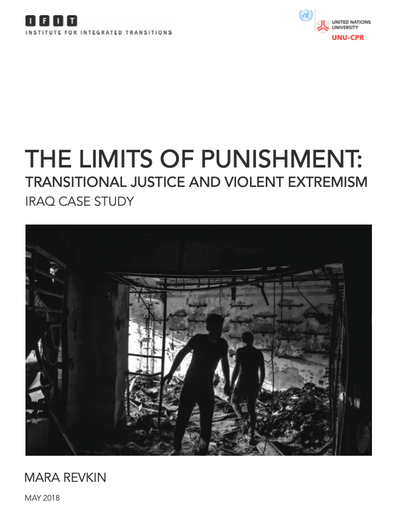TRANSITIONAL JUSTICE
|
Evidence-Based Transitional Justice:
Incorporating Public Opinion into the Field, with New Data from Iraq and Ukraine (with Ala Alrababah & Rachel Myrick) The Yale Law Journal (2024)
The field of “transitional justice” refers to a range of processes and mechanisms for accountability, truth-seeking, and reconciliation that governments and communities pursue in the aftermath of major societal traumas, including civil war, mass atrocities, and authoritarianism. This relatively new field emerged in the 1980s as scholars, practitioners, and policymakers looked for guidance to support post-authoritarian and post-communist transitions to democracy in Eastern Europe and Latin America. Since then, the field has grown rapidly—so rapidly that it is outpacing its capacity to learn from past mistakes. Recent methodological advances in the study of public attitudes about transitional justice through quantitative surveys and qualitative interview methods provide unprecedented insights into how different mechanisms—including domestic and international prosecutions, truth commissions, amnesty laws, and compensation—are perceived by their intended beneficiaries. The results have been troubling. Numerous studies in diverse contexts found that some of the most well-known transitional justice mechanisms, including those employed in South Africa, Rwanda, and Cambodia, failed to achieve their objectives of peacebuilding and reconciliation. In some cases, these policies had harmful consequences for their intended beneficiaries, including retraumatization and perceived “justice gaps” between victims’ preferred remedies and their actual outcomes.
There is an urgent need for the field of transitional justice to learn from this growing body of empirical research to develop evidence-based policies and programs that achieve their intended objectives. This Feature critically reviews the intellectual development of the field, consolidating empirical findings of relevant studies across disciplines—law, political science, sociology, economics, public health, psychology, and anthropology—and identifying open debates and questions for future research. We focus on research about public attitudes toward transitional justice in the communities directly impacted by conflict. In addition to reviewing previous research, we present new data from original public opinion surveys in Iraq and Ukraine relevant to ongoing transitional justice efforts in those countries. We use this evidence to identify lessons learned, including mistakes, in the design and implementation of previous transitional justice processes. We conclude by discussing the normative and prescriptive implications of our findings for efforts to improve future transitional justice laws and policies. |
Retribution or Reconciliation?
Post-Conflict Attitudes Toward Enemy Collaborators (with Kristen Kao) The American Journal of Political Science (2023) Short article summary in The Washington Post
Armed groups seeking to govern territory require the cooperation of many civilians, who are widely perceived as enemy collaborators after conflict ends. The empirical literature on attitudes toward transitional justice focuses heavily on fighters, overlooking more nuanced understandings of proportional justice for civilian collaborators. Through a survey experiment conducted in an Iraqi city which was controlled by the Islamic State, we find that variation in the type of collaboration an actor engages in strongly determines preferences for punishment and forgiveness. While exposure to violence is associated with a greater desire for revenge, perceived volition behind an act—a relatively unstudied factor—is much more important. This research provides unique empirical data on the microfoundations of enemy collaborator culpability. By widening our analytical lens to consider a more realistically broad spectrum of enemy collaboration, we avoid affirming a false dichotomy between victims and perpetrators that is commonly adopted in post-war settings.
After the Islamic State:
Balancing Accountability and Reconciliation in Iraq Short article summary in Lawfare United Nations University (2018)
This report addresses how Iraqi and Kurdistan Regional Government (KRG) authorities can, in the aftermath of the retaking of Mosul and other formerly IS-controlled areas, accurately and fairly distinguish between IS affiliates who pose a genuine threat to national security and civilians who merely lived and worked in areas controlled by the group. It also assesses how trust can be rebuilt in multi-religious, multi-ethnic communities, where Sunnis are feared or resented for their actual or perceived collaboration with IS, and what strategies can help bring an end to cycles of violence and revenge. It further considers whether transitional justice frameworks could offer an alternative to the dominant, highly punitive approach, by granting amnesty for individuals who are not accused of serious crimes. The report is based on fieldwork and interviews conducted in diverse locations in Iraq in April and December 2017, observations of trials of IS affiliates, and a large-scale survey of more than 1,400 residents of Mosul.
| ||||||

